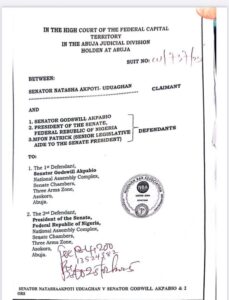Senator Natasha Akpoti-Uduaghan has initiated legal proceedings against Senate President Godswill Akpabio, alleging defamation following a contentious exchange regarding her legislative role. The lawsuit was filed on Tuesday at the Federal Capital Territory High Court, with Akpabio and his senior legislative aide, Mfon Patrick, named as defendants.
In the suit, Akpoti-Uduaghan, represented by her attorney Victor Giwa, claims that a Facebook post by Patrick, under Akpabio’s direction, contained derogatory remarks about her. The post, titled “Is the Local Content Committee of the Senate Natasha’s Birthright?” included statements suggesting that Akpoti-Uduaghan equates being a lawmaker with superficial appearances.

Giwa argues that these comments were not only defamatory but also designed to provoke and disparage Akpoti-Uduaghan, damaging her reputation among her peers and the public. The lawsuit seeks a declaration that the statements made by Patrick, at the behest of Akpabio, were defamatory and intended to incite public disdain toward her.
In addition to seeking a public apology, Akpoti-Uduaghan is requesting a permanent injunction to prevent the defendants from making any further defamatory statements about her. She is also demanding ₦100 billion in damages and ₦300 million to cover litigation costs.

The case highlights the ongoing tensions within the Nigerian Senate and raises questions about the conduct of public officials in their interactions with one another.
While specific details of the allegations remain under wraps, sources indicate that Senator Natasha claims to have endured years of sexual harassment at the hands of the Senate President. The lawsuit seeks substantial damages for emotional distress, reputational harm, and other related grievances, marking a significant moment in the fight against sexual misconduct in political spheres.

As the legal proceedings unfold in the FCT High Court, the media and the public will be closely monitoring the developments of this historic case. Legal experts and political analysts are weighing in on the implications of the lawsuit, emphasizing its potential to influence future policies and attitudes towards sexual harassment in Nigeria’s political institutions.






